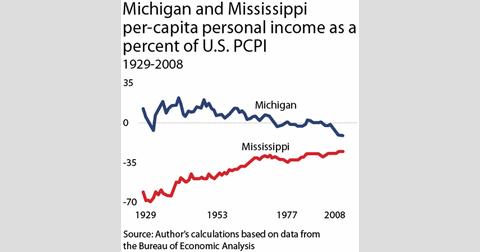Mississippi Not Burning
But its economy has been hotter than Michigan’s
"Reporting Michigan" and other Lansing-based newsletters reported in October that while scolding the Legislature for not raising taxes, Gov. Jennifer Granholm took a gratuitous swipe at the state of Mississippi. The comment raised the eyebrows of economists who actually follow and care about statistical reality and truth. Some Mississippi legislators and bloggers also took umbrage at the sneer, and rightfully so.
According to Gongwer News Service, Gov. Granholm argued that, "What we're fighting for is Michigan not becoming Mississippi." She was presumably referring to Mississippi's historical standing as a relatively poor state. But a more nuanced examination of the data suggests several reasons that this single cliché provides a spurious argument at best for advancing higher taxes in Michigan.
For starters, states with an "agricultural legacy" such as Mississippi typically have a long history of lower incomes. In a paper on right-to-work states, economist W. Robert Reed wrote that an "important determinant" of current wages is how large a share of a state's total income in the past was generated by the agricultural sector: "The economic past still casts a long shadow on the economic present." Scholars (or politicians) who fail to consider a state's economic past may misinterpret reasons for its economic well-being or lack thereof today.
In 1929, average incomes in Mississippi were a whopping 60 percent below the national average. In contrast, in 1929 Michigan incomes were 13.3 percent above the national average. These figures are relevant starting points, but more important for us today are the overall trend lines.
In plain terms, Michigan was a relatively wealthy industrial powerhouse in the first half of the 20th century, but over the past 60 years has trended lower. Mississippi started in extreme poverty and has made great strides against long odds and obstacles. (See chart.)
Is it possible that not long from now Mississippi incomes will exceed those of Michigan? I wouldn't bet against them.
Indeed, on many key economic indicators, Mississippi has outperformed Michigan in this decade, despite being blasted by Hurricane Katrina four years ago.
In the last five years, the Magnolia State ranked 18th in the nation in per-capita personal income growth. Michigan's personal income growth ranking? Dead last.
During the same time period, Mississippi's state gross domestic product increased by 5 percent, while Michigan's fell 4 percent.
In addition, since 2003, unemployment rates also have been rising in Michigan and falling in Mississippi, not counting the current recession when joblessness has increased in both states. The unemployment rate trend lines crossed in March 2006; since then, Michigan's unemployment has been higher than Mississippi's.
In fact, Michigan's unemployment rate has led the nation for 43 consecutive months. Only three times since 1976 has a state recorded higher unemployment than Puerto Rico: twice this year by Michigan and once by Louisiana, for just one month immediately following Hurricane Katrina.
It is true that Mississippi's poverty rate is much higher that Michigan's — another legacy of the state's agricultural past and other unique factors (concentrated poverty rates that are 50 percent higher than the state's average are found in 14 rural Mississippi-delta counties). However, since 2005, Michigan's poverty rate increased by 9 percent while Mississippi's has been unchanged, and over the past 20 years, the trend has been toward less poverty in the southern state.
These compelling statistics are not lost on all Michigan politicians. Shortly after Gov. Granholm's Mississippi remark, freshman lawmaker Tom McMillin offered an amendment to a tax hike bill suspending the increase until Michigan's unemployment rate (15.2 percent) dropped below Mississippi's (currently 9.5 percent).
As mentioned, some Mississippi legislators and bloggers found Gov. Granholm's comments — shall we say — lacking in southern graciousness? One blogger mocked the Yankee governor by posting, "halp us geinfr grandhome — weer frum Missippi."
Has Mississippi been a relatively poor state? Yes. But if present trends continue, the Great Lakes State may watch the Magnolia State pass it by in wealth and in prestige. The way to prevent that is for Michigan to stop raising the cost of living, working, and investing here and instead decrease taxes and regulation.
(See related story, "The Mississippi Example.")
Michael
D. LaFaive is director of the Morey Fiscal Policy Initiative at the Mackinac
Center for Public Policy. He may be reached at lafaive@mackinac.org.
Michigan Capitol Confidential is the news source produced by the Mackinac Center for Public Policy. Michigan Capitol Confidential reports with a free-market news perspective.

